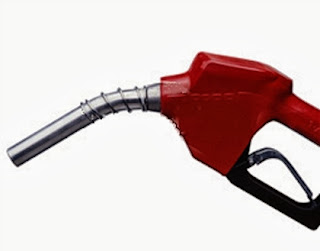I recorded my personal best fuel efficiency yesterday, on Mary Ann's 2005 Burgman 400. It was 89 mpg (Imperial units), which is approximately 75 mpg (U.S.) or 3.15 litres/100 km. This achievement was just in time for the Burgman, as we were already shopping for a replacement scooter, but now I think we will keep the Burgman for a few more years at least.
Mary Ann originally liked the Burgman 400 because of its gas mileage. Last summer, it averaged 83 mpg (Imp) travelling from Ontario to the west coast and back.
The actual 89 mpg result was on a 135 km. trip from Kitchener, Ontario to Dutton Ontario. As I left Kitchener, I filled up at a Petro Canada station. There was a 5-10 kph north wind, while I was going south west, so that helped a bit. I did the first 37 km on city streets or country roads at 60-80 kph. Then a distance of 87 km on the limited access highway "401" at 90 to 110 kph. (These are indicated speeds, so I may have been going 10% slower.) The last 18 km were on a country road at 60 kph. I may also have benefited from following in the air wake of some slower trucks on the 401. But I was not "drafting", I hope I left enough space to be safe. Normally I leave more than 3 seconds space, but at times I was not leaving that much.
So now I find it more believable when I see on the eco-modder website that a Burgman 400 rider claims 101.9 mpg (Imp) for 90 days.
http://ecomodder.com/forum/em-fuel-log.php?vehicleid=1870
My next goal would be to try and get 100 mpg going to Dutton, by avoiding the 401. I think the Burgman would get its best economy at 60 kph, not 100. However, that trip will take much longer than the very reasonable 1 hour and 45 minutes I took yesterday.

No question that a slower speed will, all else being equal, result in better fuel economy, largely because the increases in the amount of effort for increasing speeds are not linear.
ReplyDeleteHowever, 'all else' are never equal. Taking to those slower roads means more slowing down and speeding up, something which one can largely avoid on freeways, and having to speed up (i.e. accelerate the mass) seriously impacts fuel economy.
But, if you got 89 MPG in such an unstructured run, 100 MPG should be readily achievable in a more structured effort.
Personally, I wish VW would get off its corporate butt, and sell me one of their 300 MPG XL1s ... then I would have the bragging rights ... LOL!
http://www.theguardian.com/technology/2013/sep/15/volkswagen-golf-xl1-car-review
313 mpg!? Imperial gallons of course, but still unbelievable. It was measured on the new European cycle developed for plug-in hybrids, so I guess it does not really compare to the regular car tests. But according to Paul Eisenstein at CNBC, he got 138 mpg (US) driving on the autobahn at 99 mph. http://www.cnbc.com/id/100897313
DeleteVW has claimed a spot among the fuel efficiency contenders with the XL1.
ReplyDeleteBut their mass production vehicles are no slouch either. The current world record for hypermiling, at 94 MPG (Imperial), was set in June in an unmodified Passat TDI. That 94 MPG is more than 15 MPG better than current hybrid record of 78 MPG.
http://www.latimes.com/business/autos/la-fi-hy-hypermilers-world-record-20130624,0,174818.story
I was googling this record. It seems like the record was set visiting all 48 lower states, using hypermiling. Looking into some interesting advanced hypermiling techniques on the cleanmpg website (run by the driver of the record setting car), I realized that some of these techniques are controversial. Some may be argued to be unsafe, some are illegal (though not necessarily unsafe), some may reduce the life of the engine and transmission etc. By the way, it was stated the record was set "for non hybrid vehicles". Logically, if you set a record for mpg that beats the best hybrid, have you not set the overall record? I am still a bit confused by that.
Deletehttp://www.cleanmpg.com/forums/showthread.php?t=1510
When I set my personal best mpg run to Dutton, I may have broken a few laws too. I am not a scofflaw, but I also break a lot of laws on a low mpg run, just different laws. I guess I may also be in violation of some laws right now, just typing this comment.
In any area, extreme optimization of a single parameter will often have negative or dilatory effects on all the others. Hypermiling has become competitive and maximum distance per unit of fuel is paramount. If the life of vehicle components is somewhat shortened, so be it. If there are minor infractions of the highway code, so be that.
DeleteBut, let's face it ... most of us would rather not be bothered with the hassles of 'burn & coast' and such techniques.
As far as the 'non-hybrid' classification ... Guinness has various categories for fuel consumption (probably to give the hybrids a break ... LOL!)